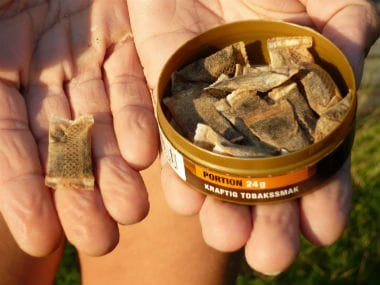Snus, a moist, smokeless, non-fermented, pasteurised, powdered tobacco, is making a comeback in parts of Europe and America, with the blessings of science. Studies have shown that in people who can’t (or won’t) quit smoking, moving to snus has far fewer harmful effects for health. But what is snus, and how exactly is it better than cigarettes? Read on to know: [caption id=“attachment_7679211” align=“alignleft” width=“380”]  Representational image. Image source: Getty Images.[/caption]
What is snus?
Sold in tea-bag like packets, snus is a moist form of snuff tobacco. Its main ingredients are ground tobacco and salt. Manufacturers may also use food-grade smoke aroma flavourings, herbs or floral flavours to enhance its taste. The nicotine content of snus varies from brand to brand. Swedish snus is regulated as a food under the Swedish Food Act.
Where did it even come from?
The short answer: 18th century Sweden. Popular in Sweden and Norway, it is also available in the US and India now.
How do people use snus?
By placing it in under the top lip, right beside the teeth. The mucous membranes absorb the snus nicotine quickly. The release of nicotine depends on the amount of saliva in the mouth.
Why don’t more smokers use snus instead?
The World Health Organization (WHO) declared snus a carcinogen in 1985 and it was banned in most of the European Union countries except Sweden. That was obviously a setback.
What’s changed now?
Research has shown that people who can’t quit smoking can find a healthier option in some brands of snus. To be sure, snus is not as healthy as not using tobacco at all. Though at least one study has suggested that the risk of lung cancer in people who use snus is comparable with those who don’t use tobacco at all. However, more studies are required to understand the risk of cancer and heart diseases from using snus.
Is snus safer than smoking?
Scientists have shown that snus is less risky than smoking or any other tobacco-based product. Studies have found that snus has low respiratory disease risk whereas smoking leads to respiratory diseases like lung cancer, pneumonia and chronic obstructive pulmonary disease. Six Swedish, Norwegian, Danish and Finnish studies found that snus poses no major health risk. No evidence was found to associate snus with cancers of the oropharynx (middle part of the throat), oesophagus (food pipe), pancreas, or heart disease or strokes. Snus is also smoke- and combustion-free hence it does not pose the risk of second-hand smoking. However, as with e-cigarettes, researchers have warned that snus can encourage tobacco use among non-smokers.
What do studies say about snus?
Sweden has the lowest mortality rate due to lung cancer or any other tobacco-related mortality in Europe. Some researchers have argued that the life expectancy of those who quit smoking and those who switched to snus is comparable. A study published in the leading journal The Lancet has suggested lifting the ban on the sale of snus in European countries where it has been banned. The study revealed that the smokers who switched to snus after quitting smoking and tobacco users who only used snus would experience fewer health effects compared with smokers.
Can snus help someone quit smoking?
In Norway and Sweden, smokers sometimes use snus as a bridge to quitting cigarettes. This is because snus has a higher success rate than any other pharmaceutical nicotine replacement product. About 11% of Sweden’s population smokes - which is the lowest rate among European countries. Reportedly, snus has helped individuals in shifting away from smoking there. Health articles in Firstpost are written by myUpchar.com, India’s first and biggest resource for verified medical information. At myUpchar, researchers and journalists work with doctors to bring you information on all things health. For more information, please read our article on Oropharyngeal Cancer: Causes, Symptoms, Treatment and Precaution_._ Neither myUpchar nor Firstpost encourages tobacco consumption in any form. The use of tobacco and tobacco products has been proven to be severely detrimental to health in multiple ways.


)

)
)
)
)
)
)
)
)



